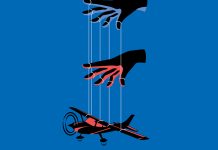Despite being born into an aviation family and being drilled from an early age in propeller awareness, I had the extremely sobering experience of coming within a few microseconds of causing a serious prop accident. My complacency in believing that it could not happen to me was in for a very serious re-evaluation.
The scene of the incident was the old aerodrome at Wangaratta in Victoria. This had been built on the edge of the Town Common and which I was very familiar with. I was overnighting there, flying a Cessna 172RG as part of my role in supervising powerline aerial patrolling, where I often had to stay overnight at various country aerodromes.
The aircraft parking area was between the airstrip and the hangar, with a clear view of the entrance road. After conducting my routine daily inspection, I prepared for engine start and departure. My normal practice was to put my flight plan and other necessities on a clipboard across my lap after I had strapped in. After the normal pre-startup checks, I visually checked the tarmac and aerodrome entrance – they were deserted, which was not surprising due to my early departure. At that stage I placed my hand on the ignition key to fire up the engine. I cannot remember now whether I called, ‘Clear prop!’ However, I may not have done so as it may have seemed rather unnecessary with a deserted aerodrome.
At this moment I felt the clipboard slipping off my lap and instinctively grabbed it to stop it falling. This action took only a fraction of time and then I reapplied my hand to the ignition key as I looked up again.
To my absolute horror, I found I was looking into the eyes of a smiling young boy leaning on the horizontal propeller! And this was happening with my hand on the ignition key within a split second of engine start! To say the least, my shock was immense.
I was looking into the eyes of a smiling young boy leaning on the horizontal propeller!
The youngster explained that he had been riding his bike on the Common several hundred yards away when he noticed me preparing for departure and decided to come over. The Common was well behind the aircraft and the strip itself, and therefore totally out of my line of sight once seated in the aircraft.
In the time it took to momentarily steady the clipboard, he had come from behind the aircraft and, still sitting on his bike, stopped and looked over the cowl and waited to ‘surprise me’. There is no doubt that he succeeded in fully surprising me!
However, he surprisingly said he had done this before. It appeared that he was in the habit of deliberately trying to time his arrival to give his cheeky surprise to pilots. Of course, I asked if any of the other pilots had warned him of the extreme danger in what he had been doing. He replied they had not. Needless to say, I had quite a long talk with him to explain how close he came to being seriously injured, or perhaps worse, and educating him about prop danger.
But, just as importantly, it was a very overdue wake-up call for me. The closeness of this near miss to being a terrible accident haunted me for the remainder of my flying career. Complacency in believing that you have all the bases covered is well known as a key ingredient in flight accidents. In this instance, I had dropped my guard, and the result could have been catastrophic for this young lad who was guilty of nothing more than a cheeky nature and youthful curiosity.
Lessons learnt:
It is totally my responsibility when operating an aircraft to protect members of the public against inadvertent injury. It was a sobering wake-up call to me that despite my solid aviation background, together with extensive work experience in accident prevention, I had failed in this basic requirement of a pilot in command.
Have you had a close call?
8 in 10 pilots say they learn best from other pilots and your narrow escape can be a valuable lesson. We invite you to share your experience to help us improve aviation safety, whatever your role.
Find out more and share your close call.
Disclaimer
Close calls are contributed by readers like you. They are someone’s account of a real-life experience. We publish close calls so others can learn positive lessons from their stories, and to stimulate discussion. We do our best to verify the information but cannot guarantee it is free of mistakes or errors.






Comments are closed.